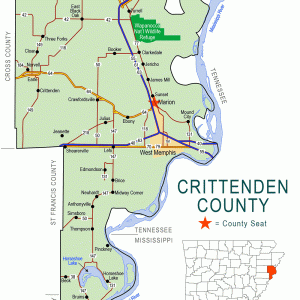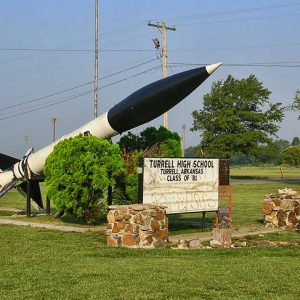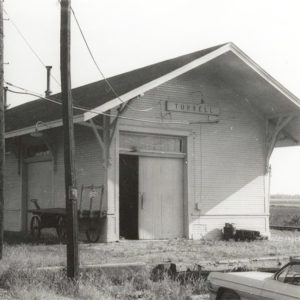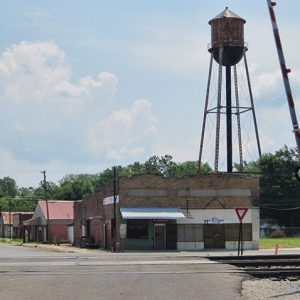calsfoundation@cals.org
Turrell (Crittenden County)
| Latitude and Longitude: | 35º22’47″N 090º15’28″W |
| Elevation: | 226 feet |
| Area: | 5.35 square miles (2020 Census) |
| Population: | 517 (2020 Census) |
| Incorporation Date: | November 12, 1926 |
Historical Population as per the U.S. Census:
|
1810 |
1820 |
1830 |
1840 |
1850 |
1860 |
1870 |
1880 |
1890 |
1900 |
|
– |
– |
– |
– |
– |
– |
– |
– |
– |
– |
|
1910 |
1920 |
1930 |
1940 |
1950 |
1960 |
1970 |
1980 |
1990 |
2000 |
|
– |
– |
456 |
515 |
670 |
794 |
783 |
1,041 |
988 |
957 |
|
2010 |
2020 |
|
|
|
|
|
|
|
|
|
615 |
517 |
|
|
|
|
|
|
|
Turrell is an incorporated city located along Interstate 55 in northern Crittenden County, about five miles south of the border with neighboring Mississippi County. The town first coalesced in the 1880s around timber-cutting operations owned by Wisconsin native Fletcher E. Turrell, for whom the town is named. Turrell ran the Turrell-Lily Lumber Company, among other local business ventures, and also served as the first postmaster. Aided by the presence of a railroad constructed in 1883, other timber-related businesses thrived at Turrell throughout its history until the cleared forest acreage was utilized as farmland, as it is today.
Well before the construction of the railroad, Native Americans once had an established village and built several mounds at what is now Turrell, most likely because of its proximity to nearby creeks that empty into the Tyronza River. The construction of the Springfield and Memphis Railroad line through the area in 1883 enabled timber pursuits to expand in earnest, thus sparking the establishment of the Turrell community. Fletcher Turrell eventually sold his interests to the Baker Lumber Company, which went on to become the largest employer in town. Besides its sawmill, the Baker operations included a commissary, the company namesake Baker Hotel, another hotel, and some company housing. Baker employed around 400 workers at the height of its operations, which concluded in 1916. Other industries once present in Turrell included the Frisco Stave Company, which made automobile wheel spokes, and the Arkansas Carriage Wood Company, which made wagons and buggies. The Toof, McGowan & Company lumber firm also cut timber in Turrell and was contemporaneous with Fletcher Turrell’s firm before its sellout to Baker. The Baker Hotel served as the social hub of early Turrell and even hosted musical acts from Memphis, Tennessee, but lack of any proper roads through this part of Crittenden County meant all visitors had to arrive by train.
Texas-born James G. Tarver, likely Turrell’s most prominent citizen, purchased a 900-acre property north of Turrell in 1932. Tarver performed as the “Texas Giant” and traveled with the Ringling Brothers and Barnum & Bailey Circus from 1909 to 1935. He also starred in a 1918 cinema production of Jack and the Beanstalk. Though accounts differ, Tarver was recorded to be 8’6″ tall and weighing (at one time) 435 pounds.
The first school in the Turrell area for whites met in a farm tenant house for a few months in 1905. Afterward, the school met in a two-room building that was constructed in 1909. In 1921, the Turrell school district consolidated with five neighboring districts, and a six-classroom brick structure was finished in 1923. In 1934 and 1947, fires destroyed the schools on this property, but they were rebuilt each time. Black students attended a short-lived school named the Crittenden County Industrial School starting in 1921. Beginning in 1941, the William R. Golden School served black students until the construction of the new junior-senior high school and desegregation in 1968. In May 2010, the Arkansas Board of Education consolidated the Turrell district with that of Marion (Crittenden County).
In 1944, a prisoner-of-war (POW) camp was established in Turrell on Arkansas Highway 77 across from the Turrell High School campus. Built to house German troops captured in North Africa, this camp was one of four established in Crittenden County and housed about 500 prisoners. These POWs were contracted out to farmers for manual labor across eastern Arkansas, thus supplying needed agricultural manpower during World War II. The Turrell camp closed in 1946.
The wilderness and river bottomlands that once isolated the Turrell area also provided an abundance of recreational opportunity. A group of Memphis businessmen purchased the lands surrounding Wapanocca Lake for use as recreational hunting grounds, and, in 1886, established the Wapanocca Outing Club (or Wapanocca Hunting Club). The club grew to become nationally prestigious but encountered tax problems beginning in the 1920s. Corporate reorganizations and selling of club lands occurred over the years until the land was purchased by the federal government in 1962, which established the Wapanocca National Wildlife Refuge. This refuge is renowned for excellent fishing and small-game hunting.
The police and city government of Turrell have been the focus of several state government and news investigations in recent years. In response to past ticket-writing practices and inquiries into its officers violating a 1996 state speed trap law, Turrell police have been restricted from patrolling traffic on neighboring Interstate 55. Mayor Franklin Lockhart has been under investigation for several counts of financial nonfeasance, and, in recent years, the city has operated without a budget, in violation of state law.
When Interstate 555 is completed, Turrell will be at its southern terminus. Interstate 555 will follow the current route of U.S. Highway 63 and connect Jonesboro (Craighead County) with Interstate 55 via a controlled-access highway.
For additional information:
“Corruption Probe Given to Prosecutor.” The Evening Times. April 7, 2010. Online at http://www.theeveningtimes.com/articles/2010/04/07/news/news4.txt (accessed February 15, 2022).
Lesnick, Gavin. “Turrell School District Consolidated into Marion.” Arkansas Democrat-Gazette. April 12, 2010. Online at http://www.arkansasonline.com/news/2010/apr/12/turrell-school-district-consolidated-marion/ (accessed February 15, 2022).
Oman, Noel E. “5 Cities Denied State Police’s OK to Patrol Interstates.” Arkansas Democrat-Gazette. January 2, 2010. Online at http://www.arkansasonline.com/news/2010/jan/02/5-cities-denied-state-polices-ok-patrol-i-20100102/ (accessed February 15, 2022).
Woolfolk, Margaret Elizabeth. A History of Crittenden County, Arkansas. Greenville, SC: Southern Historical Press. 1993.
Adam Miller
Searcy, Arkansas
 Crittenden County Map
Crittenden County Map  Turrell High School
Turrell High School  Turrell Depot
Turrell Depot  Turrell Street Scene
Turrell Street Scene 




Comments
No comments on this entry yet.